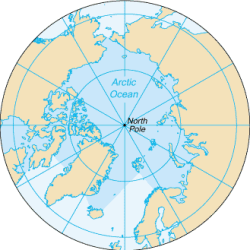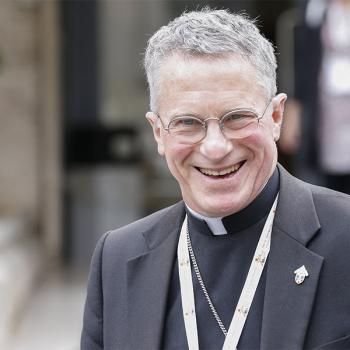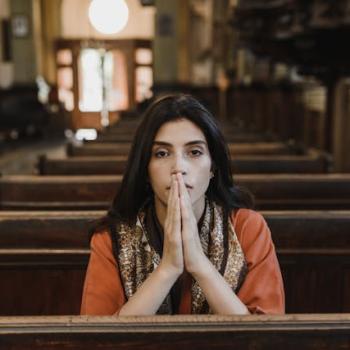But what of the other beards in the film? Martin Harris is the prime example of the "venerable beard." In his case, it probably exists more for historical accuracy than anything, just as Joseph Smith was historically beardless. Historical accuracy will generally trump visual motif in a film by church members, for church members, about church members. Hence the evil beard is rendered moot not because Martin Harris is unshakably righteous, but because to the Mormon eye, Martin Harris is not Martin Harris unless he has his chin beard. It must be conceded, however, that there are a few other venerable beards placed here and there throughout the film, largely among the elderly, or in some cases, the friendly non-Mormons. In the modern LDS parlance, theirs are mostly beards of omission, being too groomed and presentable to be outright evil, but nonetheless still too bearded to be Mormon.
Before examining the remaining films, a generic observation must be made concerning "beards in the crowd." Most viewers, upon watching the films, will notice that there are certainly beards in the Mormon crowd as well as clean-shaven faces in the mobs. However, they never speak. They are strictly extras. Only clean-shaven faces speak for Mormonism in the films, while only bearded faces lead the mobs.
The practice continues throughout American Zion. At the beginning of the film, a trimmed Joshua returns to Palmyra to extend an olive branch of sorts to Lydia (now played by Sera Bastian). But, rebuffed and repudiated, Joshua slinks back to Missouri with a once-again large beard for his proposal to Jesse (Emily Podleski), after which they are married (outside of Mormonism) by a bearded minister with a mutton-chopped witness.
Later on, when Jesse fails him in his attempt to further acts of evil, he pursues her into the street in anger. While the films feature a number of more glaring departures from the books, this understated sequence is particularly telling. Whereas in the books Joshua beats Jesse so severely that the evidence of it is still visible weeks later when she's seen by Nathan, the movie opts to have Jesse escape. In keeping with the motif of the series, the audience doesn't need to see Joshua beat Jesse as he does in the books because, visually speaking, his beard compensates. It is evil enough for the viewer to be spared the necessity of visual violence. While the integrity of the choice can be debated from many sides, it would nevertheless seem to call into question Swofford's assertion that the book "flows easily into a screenplay."
The manifestation of the evil beard extends beyond Joshua, however. In more than one scene, Joseph is accosted or beaten by bearded and unshaven men. Melissa Steed's courter, Carl Rogers, lacks facial hair, thus making him an acceptable enough candidate for marriage that after one viewing, he's never shown again -- only referenced, and indirectly at that. Jessica is also later on protected in Missouri by a beardless guardian, the opposite of her husband not only in form, but feature.
But what truly makes the "evil beard" stand out in American Zion is not, however, in its use within Joshua's storyline. Remember that because Joshua's beard is an obvious choice by the production, it calls every other beard -- or lack thereof -- into question. If the "evil beard" truly exists, then it must do so with every character. Therefore, an examination of Benjamin and Nathan is equally appropriate. It is not coincidence that Nathan has remained clean cut throughout the first film and into the second as it evidences his good nature and firm testimony. And Benjamin, who becomes the narrator of both American Zion and A House Divided, meanwhile, remains a viable protagonist and candidate for conversion precisely because he remains culturally ideal, i.e., beardless. But the introduction of facial hair into their lives underscores their respective conflicts.
In American Zion, Ben first indulges in the shadow of a beard when Martin Harris berates him for his stubbornness and lack of commitment. While Ben's clean-shaven face doesn't return in accordance with his baptism, it does however correlate to his support of Joseph. Later on, as Zion's Camp marches forth, it is Nathan who begins to meddle with facial hair, sporting a few days' growth in conjunction with giving voice to his sudden doubts about Joseph. He is gently rebuked by his father, who also grows some scruff to flirt with his new foray into evil... whether or not to kill Joshua in the film's climax for whipping Nathan. This is not insignificant as it is the only time in the trilogy that both Nathan and Benjamin dally in true damnation (Benjamin withholds forgiveness much of the film, but remains an upstanding person). Could it be coincidence? Surely the rigors of Zion's Camp merited a few days' reprieve from shaving? This explanation could easily satisfy except that Joseph Smith, Parley Pratt, and Brigham Young remain perfectly clean-shaven -- an outward symbol of their inward fortitude. Their grooming, as their testimonies, remains unyielding. With Nathan and Benjamin, as with Joshua, the beard therefore remains symbolic of evil.




